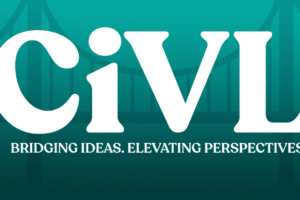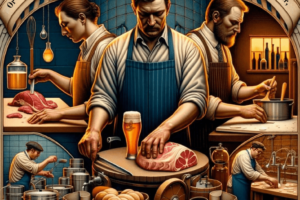(From the Ask Dr. Ruwart section in Volume 20, No. 1 of the Liberator Online. Subscribe here!)
QUESTION: I favor liberty and minimal government intrusion. But I’m wrestling with the issue of  protection of children within the home. I’m struggling a little to find a happy medium between a total “hands off” approach that would balance my rights, as homeowner, to leave big nasty kitchen knives lying around, electrical sockets exposed with metal objects stuck in them, big holes in the ground, staircases with boards missing, etc. (I know some of those are silly/extreme examples but legislation typically makes no distinction between the sensible and the surreal), with the rights of children in the house.
protection of children within the home. I’m struggling a little to find a happy medium between a total “hands off” approach that would balance my rights, as homeowner, to leave big nasty kitchen knives lying around, electrical sockets exposed with metal objects stuck in them, big holes in the ground, staircases with boards missing, etc. (I know some of those are silly/extreme examples but legislation typically makes no distinction between the sensible and the surreal), with the rights of children in the house.
Obviously an adult could see that such a place was a deathtrap and make an informed decision to visit or not. But what about children? What about my own children, who wouldn’t be able to make an informed decision whether to continue to live in the house because they wouldn’t know any different and wouldn’t have the freedom to leave anyway. And what about my children inviting their friends back to my house? Their friends wouldn’t necessarily understand the dangers or be able to make an informed decision whether to accept the risks.
MY SHORT ANSWER: You’re right: regulators can’t possibly know what a homeowner should do to child-proof a home. Nor would they have enough resources to inspect every place that houses children even if they did.
Keeping a child safe is part of parenting; some parents will do a better job of it than others. No parent can anticipate every safety hazard, but on average, they’ll do better than bureaucrats. Children of parents who are chronically drunk, high, or just plain neglectful will almost always have more accidents than children of attentive, sober ones. Neglectful parents will ignore regulations; attentive parents won’t need them, as they’ll be constantly trying to anticipate potential problems. As hard as it is to accept, we will never have a society where every child lives in an accident-free home; perfection just isn’t an option in human relations.
From a libertarian perspective, we might ask how we can have a society where fewer parents are neglectful, since regulations aren’t going to help much, if at all. In a society with less government interference in the marketplace, jobs would be more plentiful, the average paycheck would buy more, and people wouldn’t be kept from the work they prefer by regulations that shut them out. People would be less frustrated and have more free time, so “drowning one’s sorrows” in booze or mind-altering drugs would be less attractive. (For details, see my book, Healing Our World; the 1992 edition can be read for free at ruwart.com).
Most of us can get a sense of this by asking our grandparents and great-grandparents how they were raised. Wealth creation was slower back then, times were harder, and children were expected to do dangerous jobs, like working on the farm with animals and machines. Spanking and even frank beating were thought to build character. On average, harsh conditions produce harsh childhoods, although there are exceptions. Long hours in the fields or factories left our elders too tired to be as attentive as they might have otherwise been.
Must we wait for government to subside before children can be protected in their homes? Not at all! If you feel moved to teach others how to child-proof a home, it’s easy to share such information on a personal blog, Facebook, etc. First-time parents are especially eager to learn such things.
Although government is seldom, if ever, the answer, individual initiative almost always is.
LEARN MORE: Suggestions by Liberator Online editor James W. Harris for further reading on this topic:
* “Wage War on Poverty with Libertarianism” by Jacob Hornberger. Poverty is not the only reason for unsafe housing. But higher incomes generally mean safer homes, better education, higher standards of living, and so forth. In this article the president of the Future of Freedom Foundation tells how libertarian policies could achieve that.
EXCERPT: “There are five libertarian keys to ending or greatly alleviating poverty. These keys apply not only to the United States but to every other nation in the world. If any nation wants to end poverty or at least to drastically reduce it, what follows is what it should do. Any nation that adopts the following five principles will, in both the short term and long term, achieve rising standards of living, especially for the poor.”
* “The Nanny State” by Adam Young, Mises Daily, August 6, 2001. This short article explores how markets can provide better, more innovative safety for families than regulation.
EXCERPT: “Many calamities are preventable — not by bureaucratic means, but by simple attentive parenting and common sense — but nothing can take away the inherent risk of calamity that exists every day of our lives. An irrefutable fact of reality is the unpredictability of the future and all the accidents that result. The problem here is to balance risk of harm with the prospects of success, and that is something only the private sector does well. …
“If government regulations did not crowd out private testing and rating services, then rating guides, reports, and private-sector safety consultants would be more available, comprehensive, and affordable than they are now. State regulation breeds irresponsibility and blame shifting. Tangles of regulations impose costs that price competitors out of the market and prevent the invention of new designs and superior and cheaper products which, under the existing regulations, would become technically illegal.
“The free market would encourage entrepreneurs to create rating and safety systems that would perform the dual role so claimed, but never actually delivered on, by the government — namely, providing consumer safety and respecting consumer choice. Only products tested by the market can find the right balance. Anyone who has looked through baby-product catalogs knows that safety is extremely important in this market.
“If safety, as arbitrarily and remotely defined by bureaucrats in Washington, is to be imposed regardless of the cost, then why not take the next step? Parents themselves should be trained and licensed by the government, all in pursuit of the ideal of ‘safety.’ Forget the Nanny State; we need a full-time Parental State. It may sound absurd and dangerous to liberty, but one wonders how many politicians and bureaucrats today could marshal arguments against the idea.”
 Got questions? Dr. Ruwart has answers! If you’d like answers to YOUR tough questions on libertarian issues, email Dr. Ruwart
Got questions? Dr. Ruwart has answers! If you’d like answers to YOUR tough questions on libertarian issues, email Dr. Ruwart
Due to volume, Dr. Ruwart can’t personally acknowledge all emails. But we’ll run the best questions and answers in upcoming issues.
Dr. Ruwart’s previous Liberator Online answers are archived in searchable form.
Dr. Ruwart’s latest book Short Answers to the Tough Questions, Expanded Edition is available from the Advocates, as is her acclaimed classic Healing Our World.

























